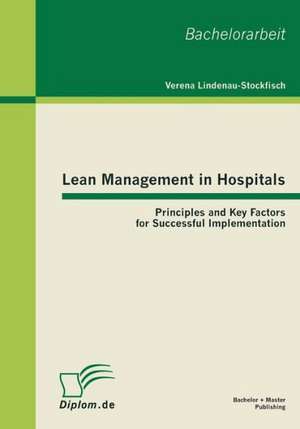Lean Management in Hospitals: Principles and Key Factors for Successful Implementation
Autor Verena Lindenau-Stockfischen Limba Engleză Paperback – 31 dec 2010
Preț: 259.62 lei
Nou
Puncte Express: 389
Preț estimativ în valută:
49.68€ • 51.68$ • 41.02£
49.68€ • 51.68$ • 41.02£
Carte disponibilă
Livrare economică 24 martie-07 aprilie
Preluare comenzi: 021 569.72.76
Specificații
ISBN-13: 9783863410186
ISBN-10: 3863410181
Pagini: 76
Dimensiuni: 178 x 254 x 4 mm
Greutate: 0.15 kg
Editura: Bachelor + Master Publishing
ISBN-10: 3863410181
Pagini: 76
Dimensiuni: 178 x 254 x 4 mm
Greutate: 0.15 kg
Editura: Bachelor + Master Publishing
Notă biografică
Verena Lindenau-Stockfisch was born on February 6, 1976 in Meißen (Saxony) and grew up in the today's known New Laender in Germany. After her graduation as an International Management Assistant in 2003, she was working in an export company, specialised on turn-key hospital projects mainly in the Middle East. In 2009, she graduated from her extra-occupational but full-time BA studies that were important to improve her professional skills in the fields of Business Administration. Various stays abroad, among others in Great Britain and South Africa, as well as the BA studies mainly held in English, contributed to her language skills and enabled her to work on an academic level.Already during her work as a Project Manager, she gained comprehensive experience with regard to structuring, elaboration and budgeting of international hospital projects. Above all, her position demanded the ability of leading a project team and cooperation with engineers, medical planners and architects and to ensure optimal process structuring in a hospital from the very beginning. At a German-Arabic Health & Economy Congress in 2006, she became first acquainted with the definition Lean Healthcare. Since that day, she has been fascinated and intensively studied the topic Lean Management in Hospitals. Since January 2011, Ms Lindenau-Stockfisch has been working for a hospital near Leipzig. In her position as a Manager for Strategic Planning she is accepting the challenge of introducing and implementing the Lean Methodology there.










